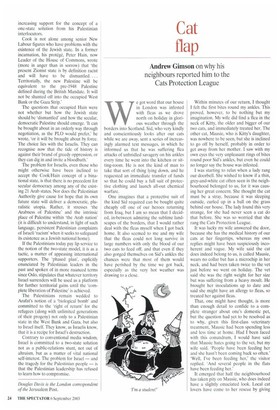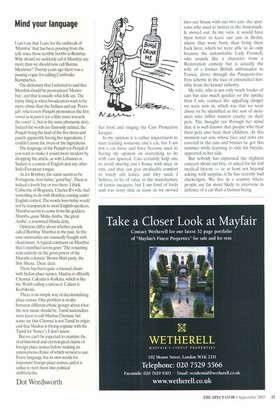Cat flap
Andrew Gimson on why his neighbours reported him to the Cats Protection League Ive got word that our house in London was infested with fleas as we drove north on holiday in glorious weather through the borders into Scotland. Sid, who very kindly and conscientiously looks after our cats while we are away, sent a series of increasingly alarmed text messages, in which he informed us that he was suffering flea attacks of unbridled savagery on his ankles every time he went into the kitchen or sitting-room. He is not the kind of man to take that sort of thing lying down, and he requested an immediate transfer of funds so that he could buy a full suit of protective clothing and launch all-out chemical warfare.
One imagines that a protective suit of the kind Sid required can be bought quite cheaply off one of our heroes returning from Iraq, but I am so mean that I decided, in-between admiring the sublime landscapes of the borders, that I would rather deal with the fleas myself when I got back home. It also seemed to me and my wife that the fleas could not long survive in large numbers with only the blood of our two cats to feed off, and that even if they also gorged themselves on Sid's ankles the chances were that most of them would have perished by the time we got back, especially as the very hot weather was drawing to a close. Within minutes of our return, I thought I felt the first bites round my ankles. This proved, however, to be nothing but my imagination. My wife did find a flea in the neck of Kitty, the older and bigger of our two cats, and immediately treated her. The other cat, Mausie, who is Kitty's daughter, was nowhere to be seen, but she is inclined to go off by herself, probably in order to get away from her mother. I saw with my own eyes the very unpleasant rings of bites round poor Sid's ankles, but even he could no longer say the house was infested.
I was starting to relax when a lady rang our doorbell. She wished to know if a thin, grey-and-white cat often seen in the neighbourhood belonged to us, for it was causing her great concern. She thought the cat must be a stray, because it was sleeping outside, curled up in a ball on the grass behind our house. The lady found this very strange, for she had never seen a cat do that before. She was so worried that she rang the Cats Protection League.
It was lucky my wife answered the door, because she has the medical history of our cats at her fingertips, whereas my own replies might have been suspiciously incoherent and vague. My wife said the cat does indeed belong to us, is called Mausie, wears no collar but has a microchip in her neck, and had been taken twice to the vet just before we went on holiday. The vet said she was the right weight for her size but was suffering from a heavy moult. He brought her inoculations up to date and said she might have an allergy to fleas, so treated her against fleas.
That, one might have thought, is more than enough detail to confide to a complete stranger about one's domestic pet, but the question had yet to be resolved as to why, given this first-class veterinary treatment, Mausie had been spending less and less time at home. Had I been faced with this conundrum, I would have said that Mausie hates going to the vet, but my wife said, 'People have been feeding her and she hasn't been coming back so often.' 'Well, I've been feeding her,' the visitor replied. 'And several people in the flats have been feeding her.'
It emerged that half the neighbourhood has taken pity on Mausie, who does indeed have a slightly emaciated look. Local cat lovers have come to her rescue by giving
her food and ringing the Cats Protection League.
In my opinion it is rather impertinent to start feeding someone else's cat, but I am not a cat lover and have become used to having my opinion on everything to do with cats ignored. Cats certainly help one to avoid sharing one's house with mice or rats, and they can give invaluable comfort to lonely old ladies, and they used, I believe, to be of value in the manufacture of tennis racquets, but I am fond of birds and was sorry that as soon as we moved into our house with our two cats, the sparrows who used to twitter in the honeysuckle moved out. In my view, it would have been better to leave our cats in Berlin, where they were born, than bring them back here, which we were able to do only because the indomitable Lady Fretwell, who sounds like a character from a Restoration comedy but is actually the wife of a former British ambassador to France, drove through the Passports-forPets scheme in the face of entrenched hostility from the kennel industry.
My wife, who is not only much fonder of cats but also much quicker on the uptake than I am, realised the appalling danger we were now in, which was that we were about to be identified as the sort of monsters who inflict wanton cruelty on their pets. The thought ran through her mind that it is well known that people who beat their pets also beat their children. At this moment our son, whose face and arms are covered in the cuts and bruises he got this summer while learning to ride his bicycle, appeared at her side.
But nobody has expressed the slightest concern about our boy, or asked for his full medical history — or at least not beyond asking, with surprise, if he has recently had chickenpox. We live in a country where people are far more likely to intervene in defence of a cat than a human being.











































































 Previous page
Previous page